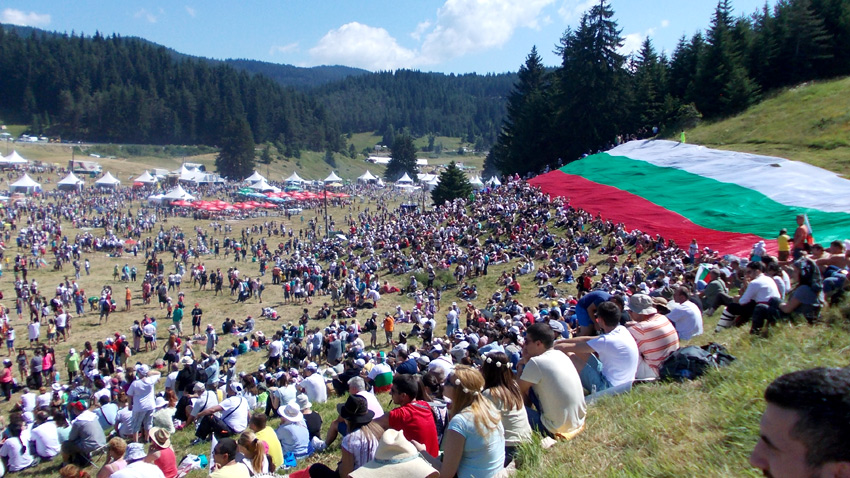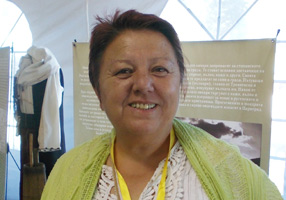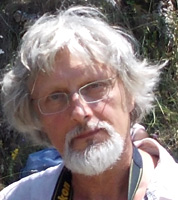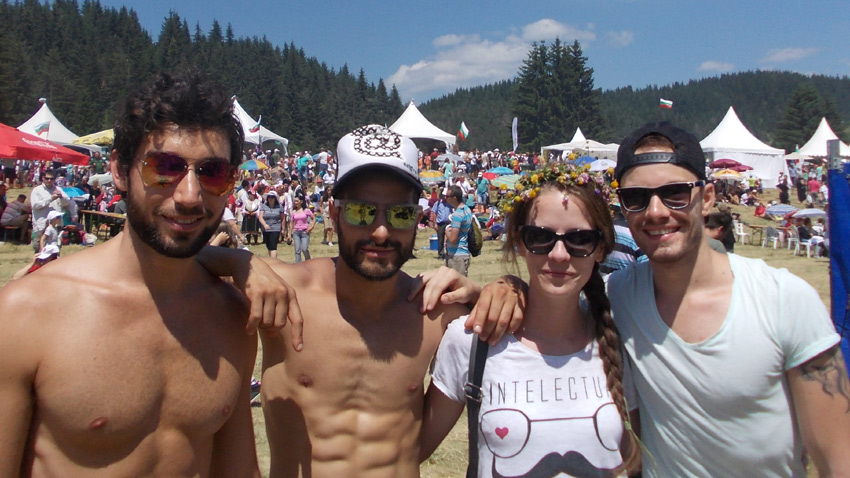The Rozhen National Folklore Fair 2015 gathered over 8,000 performers, 315 singing bands, 25 folklore ensembles and the applause of some 350,000 spectators, after 9 years of interruption. Most of the guests were Bulgarians, though one could hear Greek, Romanian, English, French and Russian across the meadows. The event has covered a long distance from the traditional clan gathering, devoted to ancient cult spots to what’s today a Fair of Folklore Arts and Stock Breeding. We will tell you a part of this story, we will meet you with people from the audience and some of the performers, you will listen to Rhodope music. The original recordings fроm the fair will be on air in a week.

 Veselina Babadjankova who has participated in the event for years and is now the host of one of the official programs says that the first thing she has ever done at Rozhen is to stop and listen to the crickets in the morning.
Veselina Babadjankova who has participated in the event for years and is now the host of one of the official programs says that the first thing she has ever done at Rozhen is to stop and listen to the crickets in the morning.
“These are my Rhodope roots and childhood memories here,” Veselina says. “Our grandparents used to gather and to take off to Rozhen with big wagons for the entire village. It was here that I heard so many singers with so many bagpipes for a first time. I see this fair as the pride of my mountain that lives with the Bulgarian spirit - the chain dance, the folk song and the beautiful clothing.”
“I know the traditions of Bulgaria,” says a 10-year-old Bulgarian, born in Madrid, who sings folk songs along with his father. There were many other Bulgarians, residing abroad at Rozhen 2015, along with lots of foreigners.  One of them – Gyorgy Stuber is a great fan of the Bulgarian bagpipe. He bought a CD with Rhodope folk music some time ago and that was the beginning of a long story.
One of them – Gyorgy Stuber is a great fan of the Bulgarian bagpipe. He bought a CD with Rhodope folk music some time ago and that was the beginning of a long story.
“I was stunned to hear music that resembled the Hungarian and was so close to my heart. I visited the Rhodope at least 20 times afterwards, looking for elderly women and recording songs. I learnt thelow-pitched bagpipe. I have many friends in Bulgaria now, I really like your country. I have my own theory on the common roots of the Hungarian, Rhodope and Chuvash music tradition.”
There were many young folk fans at the tent camp of the event. Svetoslav is from Sofia’s academy of film art and his occupation now is video processing.
“Facebook told me about the festival. Free music and dances from all folklore regions can be heard and seen here. I was a bit ashamed of not knowing any chain dance – I will look for a dancing club when I get back to Sofia.”
“I think that young people have no touch to our real culture,” says Plamena, a student from Plovdiv. “We rarely listen to authentic folklore on the radio with its real charge and the joy it brings. I dive in authentic traditions here.”
Aleidin Aliev is from the town of Sevlievo and he works as a club dancer in Plovdiv.
“I came here to touch what’s Bulgarian, what thrills us and makes us happy. I think folklore should preserve its authentic image, in order to stay real.”
Ship engineer Ivan comes from Burgas:
“I was in London and I read there that the fair would be restored – then I organized my friends. I am a real fan of Bulgarian folklore and I see our dances as the greatest thing ever.”
 The singing part of the Rozhen Fair is a contest on four stages. Renown art people from the area were the jury. Daniel Pichot, the founder of the Solidarity France – Bulgaria society received two more awards, which went to the oldest and the youngest bagpipers at the gathering – 86-year-old Ilia Kadiev from the 100 Low-pitched Bagpipes Ensemble and 5-year-old Kostadin Margaritov.
The singing part of the Rozhen Fair is a contest on four stages. Renown art people from the area were the jury. Daniel Pichot, the founder of the Solidarity France – Bulgaria society received two more awards, which went to the oldest and the youngest bagpipers at the gathering – 86-year-old Ilia Kadiev from the 100 Low-pitched Bagpipes Ensemble and 5-year-old Kostadin Margaritov.
Over 400 low-pitched bagpipes unveiled the fair, the participants also took part in the concert program. We will end up the show with a recording of the 100 Low-pitched Bagpipes Ensemble, hoping that we have managed to get you a bit closer to the Rozhen 2015 atmosphere.
English version: Zhivko StanchevThe Philip Koutev National School of Folk Arts is not just any school - it is a talent laboratory. It is the first school not only in Bulgaria but in the Balkans for professional study of folklore. It is located in the heart of the beautiful town of..
Scientists from the Sorbonne will study the cultural heritage preserved in the Regional Ethnographic Open-Air Museum "Etar" , informs public broadcaster BNT. In March this year the French scientists together with experts of REOM "Etar" will study elements..
The day of St. Tryphon (1 February old style, 14 February new style) is celebrated by vine growers, falconers and gardeners in Bulgaria. Trifon Zarezan comes around with vine pruning and wine drinking St. Tryphon is believed to help..

+359 2 9336 661
